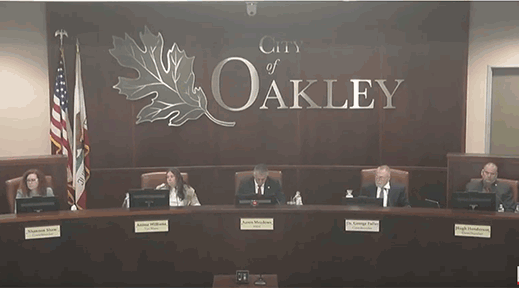The Oakley City Council will receive reports regarding the ability to issue a censure and if they are limited on expressing opinions prior to items coming before the council.
At its February 13 meeting, the Oakley City Council will receive two reports regarding the ability for city council members to comment or express opinions about pending or future agenda items. They will also receive a report regarding enforcement actions of adopted councilmember standards and ability to censure a councilmember.
Both items are in response to behaviors and actions by Councilmember George Fuller over the last two years.
The first item is in response to Councilmember George Fuller issuing a variety of opinions on his personal blog, social media prior to agenda items coming before the city council. The item them comes before the council for discussion or decisions in which he has already stated his views.
The second, the council appears to want to know their options in taking action against Fuller for his antics in publicly accusing councilmembers of a crime—even though the FPPC denied his request alleging Councilmembers Hugh Henderson and Shannon Shaw money laundered campaign funds. Fuller then lied about being denied by the FPPC while on the dais.
Report to the City Council Regarding Council Members’ Ability to Comment Upon or Express Opinions About Pending or Future Agenda Items
According to the staff report, the law concerning bias is different depending on whether the item to come before the Council is quasi-legislative or quasi-judicial
When the Council considers quasi-legislative actions, Council members are effectively acting as legislators, and thus the expression of advance positions is considered normal political activity.
Quasi-legislative actions are those that involve the making of policy. The adoption of ordinances, the consideration of general plan amendments, and the enactment of zoning ordinances are classic examples of quasi-legislative decisions. The consideration of budgets and financial matters are other examples of matters that are quasi-legislative.
Other areas that would be considered quasi-legislative include housing, law enforcement practices, and code enforcement standards. When the Council considers matters such as these, it is not a violation of the law for a councilmember to express his or her opinion in advance.
A different standard applies to quasi-judicial decisions. These are decisions in which the Council must act like a judge does—by applying law to facts. Typical examples of quasi-judicial matters include land use applications (such as conditional use permits) or code enforcement appeal hearings. Public contracting matters also involve quasi-judicial decisions, as do any matters that are initiated by or involve a private party or applicant.
When matters such as these are involved, the constitutional requirements of due process require that decision-makers not be impermissibly biased.
What constitutes an unacceptable probability of bias will inherently depend on the facts. The bar a party claiming bias must show is a high one—the party must overcome a presumption a Council members is not biased.
Based on decided cases, however, it is still prudent for Council members to refrain from expressing opinions about a quasi-judicial matter in advance of the matter being called. Advance statements of opinion in any public setting—including social media—should be avoided. The nature of a quasi-judicial hearing is such that Council members should make decisions based only on the evidence they receive as part of or during the Council’s formal consideration of a matter. When opinions are expressed before such consideration, a council member may give the appearance his or her mind is made up and that he or she has prejudged the outcome of a matter.
This does not suggest that councilmembers may never make comments about an upcoming quasi-judicial matter. For instance, statements of general concern about a matter, or expressions of a matter’s importance, are not improper, as they do not suggest prejudgment.
In short, when considering quasi-judicial actions, Council members should refrain from expressing opinions that suggest they may have pre-judged a matter’s outcome. The trigger for a claim of bias is not simply that a council member made statements about a matter, but that the statements suggest the member has already decided the matter before the presentation of evidence.

Report to the City Council regarding the Enforcement of Adopted Councilmember Standards and Censures of Councilmembers
According to the staff report, to succinctly answer the question, there is no enforceable remedy the City Council could impose to ensure compliance with any standards the Council adopts. By enforceable, I mean that there is no action the Council could take to compel a councilmember s compliance with any adopted standard. The Council s only recourse in the event of noncompliance would be through a (mostly) symbolic action known as a censure. A censure could include very limited punitive measures.
Basically, voters are the one who can discipline a councilmember by voting them out of office or succeeding in a recall effort.
Because only voters can effectively discipline a member of the City Council, to the extent the Council wishes to enforce its standards, the only recourse is to censure the offending member. A censure is a public and symbolic reproval of a member for any actions a Council majority disapproves. The censure is taken formally by motion or adoption of a resolution.
In the absence of a written censure policy, should this City Council ever intend to consider a censure, common practices and basic fairness would dictate the following process:
- One or two councilmembers would be appointed to draw up the draft, written censure. Staff and this Office could assist in the technical aspects of such drafting (e.g., formatting the text into proper resolution format). But because censures are considered the speech of a Council majority, it would be inappropriate for staff or counsel to substantively contribute to the censure s drafting.
- The draft censure would be placed as an agenda item and published in the agenda packet in the usual manner in advance of a City Council meeting.
- For sake of fair process, when the matter is called, we would follow a process akin to our public hearing procedure. The drafter(s) of the censure would provide the staff report, the subject(s) of the censure would then be given the right to rebut the proposed censure, and they would further be given a right of rebuttal after the close of public comment.
- The censure would be made if the resolution of censure is adopted by the usual motion and voting process. The subject(s) of the censure would be entitled to vote on the motion.
Usually, censures are adopted purely symbolically. That is, they simply state for the public record the position of a Council majority against the censured party or parties. Censures may, however, carry limited addition penalties, including removal from committees and divestiture of any leadership position (such as Mayor or Vice Mayor). To the extent other Council privileges are provided, the Council may strip the offending member these as well. But more substantive punishments ones that interfere with a councilmember s duties to carry out their duties are not likely authorized.
Editors Notes:
Recently, the Brentwood City Council discussed the ability to censure on multiple occasions where Councilmember Jovita Mendoza requested Tony Oerlemans be censured for an outburst after the mayor moved forward on an item after he requested it be pulled. The council ultimately decided to “give itself a warning” on policy violations. Brentwood also spent the later half of 2022 discussing its city council censure process through its ethics and conduct policy—then decided to censure former vice mayor Johnny Rodriquez.
Meanwhile in October of 2022, the Antioch City Council attempted to censure Mayor Lamar Thorpe (now Lamar Hernandez-Thorpe) during a special meeting. The meeting was scheduled, however, Councilmember Monica Wilson then opted out of the meeting. The call for a special meeting to censure Thorpe stems from a 44-page Investigate Report involving the Los Medanos Community Healthcare District and Lamar Thorpe being released. The report outlines allegations of sexual harassment based on written complaints by two employees while also includes testimony, documentation, social media screenshots, and text messages. The incident prompted the Contra Costa County Board of Supervisors to vote on a $350k settlement with the two females as a result of two women who resigned from their positions at the healthcare district due to sexual harassment, unwanted sexual advances, hostile working conditions, and other unlawful actions resulting from Executive Director Lamar Thorpe’s misconduct, and the District’s inaction, despite having knowledge of that misconduct. The settlement did state there was no admission of guilt. The meeting was cancelled in which Councilmember Mike Barbanica stated “Monica changed her mind” and offered no other details which prevented the votes needed to censure.
Oakley City Council Meeting
February 13, 2024
6:30 pm
3231 Main Street, Oakley CA
Agenda – click here


2 comments
Fuller is incompetent. He is an embarrassment to the community. I believe he should be removed from the City Council based on his belligerent conduct.
As the article points out, there are only two avenues for “removal”: a failed reelection or successful recall. The council cannot “kick out” one of its own.
Comments are closed.